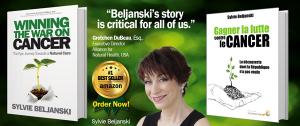Sylvie Beljanski, Expert on Environmental Factors and Immune System, Examines Rising Cancer Rates Among Young Adults
LOS ANGELES, CA, UNITED STATES, September 1, 2023/EINPresswire.com/ -- In response to the recent study revealing a concerning trend of increasing cancer diagnosis rates among younger adults, Sylvie Beljanski, Founder and Executive Vice President of The Beljanski Foundation, provides valuable insights into the complex interplay of environmental toxins and immune system resilience that could be contributing to this unsettling phenomenon.
The study, which examined more than 500,000 cases of early-onset cancer in patients under 50 between 2010 and 2019, uncovered a notable rise in cancer diagnoses among younger adults, with particular emphasis on cancers affecting women and individuals in their 30s. This research aligns with a broader international perspective, as a global review of cancer registry records across 44 countries found a rapid increase in early-onset cancer incidence, particularly in types of cancer affecting the digestive system.
Sylvie Beljanski, a prominent voice in the field of cancer research, emphasizes the role of environmental toxins in influencing DNA and, subsequently, the development of cancer. "Over 90% of cancers are due to the effect of environmental toxins on our DNA," she states. This underscores the crucial link between environmental factors and cancer development, prompting two fundamental questions: How severe is the impact of the environment, and how resilient is an individual's DNA in resisting these effects?
Beljanski suggests that the generation gap in cancer diagnosis rates might stem from a combination of factors related to lifestyle and immune system strength. Younger individuals may experience higher exposure to specific carcinogens due to lifestyle differences, leading to potential DNA damage. Additionally, the cumulative impact of various factors, such as birth via C-section, lack of access to breast milk, early and multiple vaccination campaigns, and early exposure to environmental toxins, might contribute to weaker immune systems among younger generations.
Regarding the observed gender gap in cancer rates, Beljanski points to potential gender-specific exposure to certain carcinogens, citing studies that have detected carcinogens in feminine hygiene products. She also raises the possibility that genetic differences between genders could influence the immune system's ability to handle co-factors that weaken its defenses, such as alcohol.
Dr. Otis Brawley, a distinguished expert in oncology and epidemiology at Johns Hopkins University, concurs with Beljanski's assessment, adding that lifestyle factors, including increased caloric consumption, obesity, and inadequate exercise, likely play a significant role in the rising cancer rates among younger adults.
As the world grapples with the unsettling increase in cancer diagnoses among younger populations, Sylvie Beljanski's insights shed light on the multifaceted factors at play. The intersection of environmental toxins, immune system resilience, lifestyle choices, and genetic predispositions underscores the complexity of addressing this pressing issue. Further research and a holistic approach to healthcare and well-being are crucial to curbing the alarming rise in early-onset cancer cases.
Amanda Kent
Boundless Media USA
+1 951-870-0099
email us here
Legal Disclaimer:
EIN Presswire provides this news content "as is" without warranty of any kind. We do not accept any responsibility or liability for the accuracy, content, images, videos, licenses, completeness, legality, or reliability of the information contained in this article. If you have any complaints or copyright issues related to this article, kindly contact the author above.

